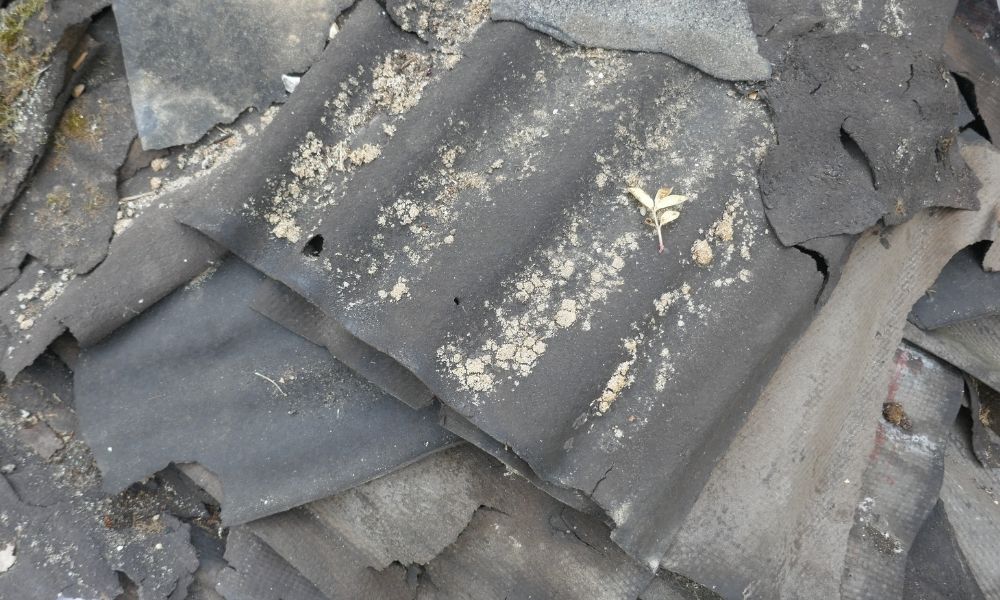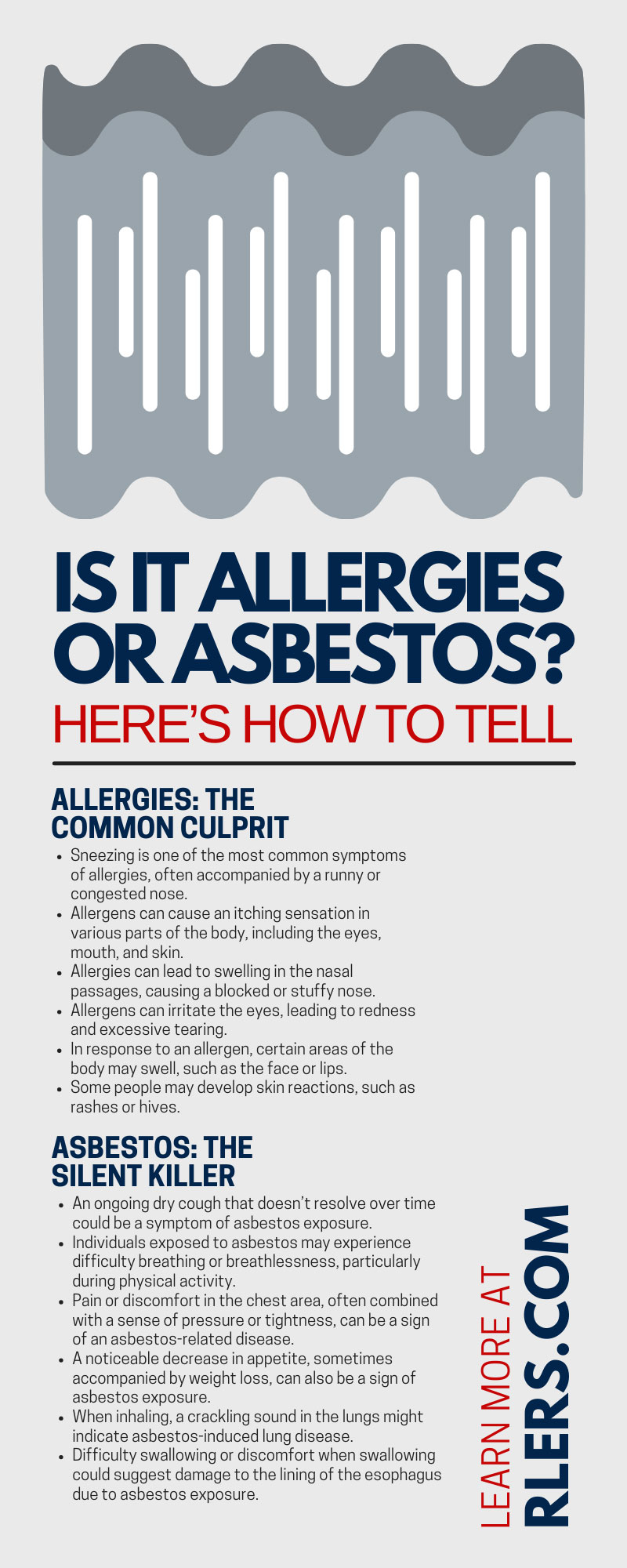
Have you been experiencing a runny nose, irritated eyes, or difficulty breathing but can’t quite pinpoint the cause? With allergies being so common, it’s easy to jump to conclusions and assume we’re merely dealing with seasonal nuisances. However, what if these symptoms indicate something much more dangerous?
Are your symptoms due to allergies or something much worse, like asbestos exposure? Take a dive deep into the topic to understand how to tell if you have allergies or are suffering from asbestos exposure.
Allergies: The Common Culprit
Allergies are medical conditions caused primarily by hypersensitivity of the immune system to something in the environment that usually causes little or no problems in most people. These substances, known as allergens, could be pollen, dust mites, mold spores, pet dander, food, insect stings, and medicines.
When a person who’s predisposed to allergies encounters an allergen, the immune system overreacts, triggering a cascade of reactions. Allergies can affect anyone, regardless of age, gender, race, or socioeconomic status. However, individuals with a family history of allergies, those with other allergic conditions, like asthma or eczema, or people living in environments with high allergen levels are often more susceptible.
Symptoms of Allergies
Symptoms of allergies can manifest in various forms, largely depending on the type of allergen and the individual’s immune response. Common symptoms include:
- Sneezing is one of the most common symptoms of allergies, often accompanied by a runny or congested nose.
- Allergens can cause an itching sensation in various parts of the body, including the eyes, mouth, and skin.
- Allergies can lead to swelling in the nasal passages, causing a blocked or stuffy nose.
- Allergens can irritate the eyes, leading to redness and excessive tearing.
- In response to an allergen, certain areas of the body may swell, such as the face or lips.
- Some people may develop skin reactions, such as rashes or hives.
- In some cases, allergies can cause respiratory symptoms, including a persistent cough or wheezing.
- Many people with allergies experience general fatigue or tiredness.
Asbestos: The Silent Killer
Asbestos is a naturally occurring, fibrous mineral widely used in the 20th century due to its heat resistance, tensile strength, and insulating properties. You can find it in various materials commonly used in the construction industry, particularly in older buildings, including insulation, ceiling tiles, floor tiles, and asbestos cement products.
Occupations such as construction workers, firefighters, industrial workers, power plant workers, and shipbuilders are at a higher risk of exposure due to their frequent contact with asbestos-containing materials. However, asbestos exposure can affect anyone. Homeowners undergoing renovations or DIY projects in older homes can unknowingly disrupt asbestos-infused materials, leading to potential exposure.
While you won’t see it as often today, asbestos isn’t completely banned and can still be in some newly manufactured products.
Symptoms of Asbestos Exposure
Asbestos exposure may not cause immediate symptoms, and the harmful effects often take years or even decades to manifest. Here are some of the potential symptoms that might indicate asbestos exposure:
- An ongoing dry cough that doesn’t resolve over time could be a symptom of asbestos exposure.
- Individuals exposed to asbestos may experience difficulty breathing or breathlessness, particularly during physical activity.
- Pain or discomfort in the chest area, often combined with a sense of pressure or tightness, can be a sign of an asbestos-related disease.
- A noticeable decrease in appetite, sometimes accompanied by weight loss, can also be a sign of asbestos exposure.
- When inhaling, a crackling sound in the lungs might indicate asbestos-induced lung disease.
- Difficulty swallowing or discomfort when swallowing could suggest damage to the lining of the esophagus due to asbestos exposure.
- Swelling in the face or neck is another possible sign of an asbestos-related condition. Although it’s less common, it may occur due to fluid buildup.
- Individuals exposed to asbestos may experience unusual fatigue or anemia, a condition characterized by a deficiency of red blood cells or hemoglobin in the blood.
How To Identify the Root of Your Symptoms
It can be hard to determine whether your symptoms are from allergies or asbestos exposure. Consider the following steps to narrow down what’s causing your problems.
Consider the Age and History of Your Home
If your home is older than 1980, you should investigate any potential asbestos-containing materials that might be present.
Hire a Professional Asbestos Inspector
A professional inspector or remediation company, like Redline Emergency Solutions, can assess your home for asbestos-containing materials and ensure that any removal or asbestos encapsulation is safe and effective.
Check for Any Home Renovation History
Improper handling of asbestos-containing materials during home renovations can lead to asbestos fibers becoming airborne and inhaled by occupants.
Consult With a Medical Professional
If you continue to experience symptoms despite addressing any potential asbestos sources in your home, consult a medical professional to rule out any other health issues.
How To Address Allergies
If you’ve ruled out the possibility of asbestos exposure, here’s how you might address allergy symptoms.
Identify the Allergen
First, you need to identify the allergen causing these reactions. You can do this through allergy tests conducted by health-care professionals.
Avoid Exposure
Once you’ve identified the allergens, the best course of action is to avoid exposure to these triggers whenever possible. However, complete avoidance may not always be feasible.
Consider Medications
Medications like antihistamines, decongestants, corticosteroids, or leukotriene modifiers may help you manage your symptoms. Some individuals may benefit from immunotherapy, which involves regular injections or oral doses of the allergen in increasing amounts to build up immunity.
Always consult with a health-care provider to understand the most suitable course of action for managing your allergy symptoms. Regular monitoring and follow-ups are crucial to ensure the effectiveness of the chosen management approach.
Both allergies and asbestos exposure have significant impacts on our health. Learning how to tell if you have allergies or are suffering from asbestos exposure is crucial to take care of your health. Being aware of the signs and symptoms of each health concern can help you determine which course of action is best.


